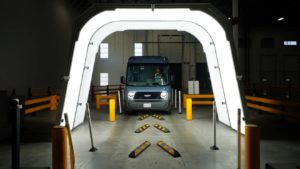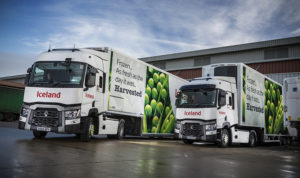
For example, Amazon has implemented a new AI–based technology in the UK that can spot small anomalies in delivery vans – from tyre deformities and undercarriage wear to bent or warped body pieces – before they become on-road problems.
Automated Vehicle Inspection (AVI), in partnership with tech start-up UVeye, sees drivers at the end of every route drive through an AVI archway and over a series of plates equipped with sensors and cameras.
With the vehicle rolling at five miles per hour, the AI system performs a full-vehicle scan in a few seconds, identifies problems, classifies them based on severity, and immediately sends the results to a computer.
From there, a delivery service partner (DSP) can determine the fixes and services they need to perform to have well-maintained vehicles on the road the next day.
AVI relies on machine “stereovision,” meaning that it uses two vantage points to construct a full 3D image, and deep learning, a subset of machine learning in which a layered neural network mimics the learning processes of the human brain.
By making inspections faster, more accurate, systematic, and objective, AVI has already found hidden damage patterns.
For example, 35% of all fleet vehicle issues relate to tyres, including sidewall tears and debris and nails lodged in treads – issues that can be challenging to spot during manual inspections.
With AVI, DSPs receive notifications to replace tyres before they turn into a bigger problem.
The output is processed in less than one minute and shows fleet managers the detected issues along with photos and repair suggestions.
Many other details can be monitored with this digital microscope, including identifying potential trip-and-fall hazards on the cargo steps and spotting hazard light damage.
Tom Chempananical, Global Fleet Director at Amazon Logistics said: “One exciting benefit of AVI is the totality of insights the technology gives fleet managers.
“It can keep track of detected vehicle issues and see if they are repeatedly happening on particular routes.
“The potential for AVI applications is huge. It could also influence Amazon’s routing and geolocation technology for when repeated vehicle damage is reported happening in the same location.”
Meanwhile, transport and logistics optimisation specialist Optimize has already delivered measurable efficiency gains for Welch’s Transport, the family-owned transport group based in Duxford, Cambridgeshire, using its AI technology.
The Palletline member was first introduced to Optimize at the beginning of 2023, and, following a successful trial which delivered a 15% reduction in mileage and emissions, it is now rolling out the technology across its 80-vehicle fleet, which also includes electric vehicles.
Optimize algorithms work across a number of customer requirements to route and schedule fleets for maximum efficiency, and allow businesses to reduce carbon emissions, by optimising fleet productivity.
Welch’s is also utilising the Optimize technology to maximise the use of its new electric vehicles, with its algorithms able to intelligently predict battery capability and available range to ensure full deployment of the EV vehicle fleet in the most efficient way.
Colin Ferguson, CEO of Optimize said: “Through the continued use of Optimize, Welch’s Transport can expect to reduce costs, increase productivity, and cut emissions.

Also, since 2021, contract logistics provider GXO has been working in partnership with Datasparq, an AI and data science services provider, to help it boost efficiency, generate cost savings and reduce environmental impact through transport route optimisation.
Together, the companies have applied AI technology to develop bespoke route optimisation tools for customers, such as retailer Iceland.
GXO transport planners asked where they wanted to deploy vehicles at each of their four Iceland distribution centres, and how they wanted to improve the frequency of delivery.
Without the use of AI that would have taken a traditional route planner about a week per scenario.
What the AI technology has managed to do, however, is run multiple scenarios that can then be sense-checked by GXO route planners in 24 hours.
By improving route efficiency, the retailer has reduced the distance driven from one depot by more than 560,000 miles per year, decreasing diesel consumption by over 25,000 litres and delivering more than 720 tonnes of overall carbon emission savings to date.
Gavin Williams, GXO Managing Director, UK & Ireland said: “We continue to invest in unparalleled technology solutions to better serve our customers, helping them boost efficiency and productivity as well as achieve their ESG goals.
“With our continued deployment of artificial intelligence, we now have even more opportunities to add value for our customers by enhancing all aspects of their logistics needs – from sorting to picking, packing and transportation.”
According to Epyx and r2c, current AI technology has the potential to predict almost half of all fleet breakdowns, create new cost management opportunities and improve operational efficiencies.
However, it says there are potential hurdles to making AI work better, including quality of data throughout the process, obtaining time-sensitive data, and building processes that can handle large streams of information and events.
Nevertheless, Epyx believes all these issues can be overcome.
Andy Partridge, Technology Delivery Director at Epyx and r2c, said: “In this context, AI is about using machine learning to examine data so that models can be built that make inferences and identify patterns that are useful in meeting objectives.
“That makes it potentially very useful when it comes to fleet service, maintenance and repair (SMR) and improving operational efficiencies for customers.

It is clear that AI has the potential to transform the way transport businesses operate with regards to maintenance and route planning and that forward thinking companies are beginning to adopt the technology now.








